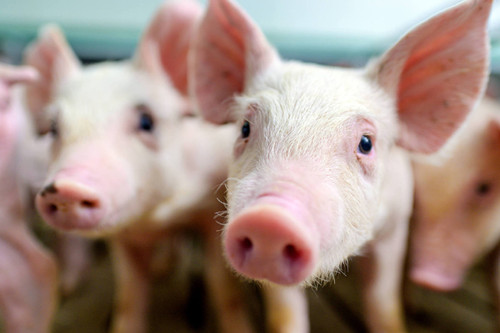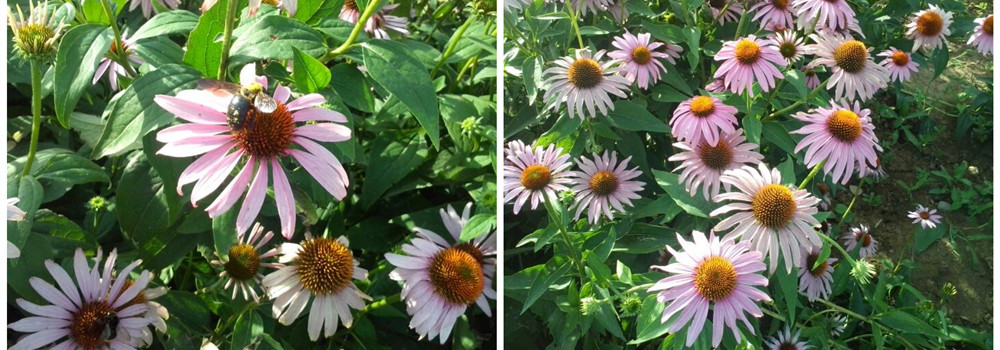Echinacea is a wildflower of the Compositae family native to America. It contains a variety of pharmacological ingredients such as polysaccharides, alkylamide, caffeic acid derivatives, flavonoids, essential oils, etc., which help to fight inflammation, fight infection, promote body growth and immunity, etc. Echinacea is used to promote the growth and development of immune organs and to enhance their immune function (non-specific and specific immunity). Nowadays, Echinacea extract has been used as a natural additive in animal feed for pigs, broilers, cows, ducks, dogs, cats and aquatic animals for immune system booster.
Echinacea For Swine
A pig experiment was conducted to study the effects of echinacea compound (echinacea and Astragalus membranaceus) on immune function and immune effect of vaccines in piglets. Piglets were randomly divided into four groups: no drug group, trial groups ⅰ, ⅱ and ⅲ (echinacea compound 1.5%, 1.0% and 0.5%, respectively) by adding different doses of echinacea compound to their diets: At 20, 35, 50, 60, 70, 80 days of age, blood samples were collected to detect the percentage of peripheral hemophilus neutrophils, lymphocyte conversion rate, antibody levels of classical swine fever and porcine reproductive and respiratory syndrome, respectively.
The results showed that a certain amount of echinacea compound preparation could significantly increase the percentage of neutrophil and lymphocyte conversion rate in peripheral blood of piglets, and significantly increase the antibody level of swine fever and porcine reproductive and respiratory syndrome vaccine. A certain amount of echinacea compound preparation can significantly improve the lymphocyte conversion rate in peripheral blood of piglets and the antibody level of the porcine reproductive and respiratory syndrome vaccine. Meanwhile, the daily gain, lymphocyte positive rate, antibody titer of classical swine fever and porcine reproductive and respiratory syndrome antibody titer of piglets in the echinacea compound preparation group with a high dose (mass fraction 1.5%) were significantly increased compared with other groups (P less than 0.05). The diarrhea rate was significantly lower than that of other groups (P less than 0.05), suggesting that echinacea can enhance the immune function of pigs, and can enhance the growth of blue ear disease virus attenuated piglets and the immune effect of attenuated virus.
Echinacea For Poultry
An experiment conducted by Xi ‘An Rainbow Biotech Co., Ltd. proved that 1 g echinacea granules was equivalent to 1.25 g echinacea crude drug, and the main active ingredient was chicory acid, the content of o. 58%. Sixty thousand one-day-old healthy broilers were randomly divided into 4 groups with 3 replicates in each group. The blank control group was not fed echinacea granules, and the experimental group was continuously fed echinacea granules with different concentrations from 4 to 13 days of age. The blank control group and experimental group were immunized with the combined inactivated vaccine (LaSota strain +HP strain) of Newcastle disease and avian influenza (H9 subtype) at 7 days of age, respectively.
| Group | Groups | Quantity | Details |
| No drug group | 3 | 5000 | Add no drugs, normal feeding for 10 days, routine immunization |
| High does | 3 | 5000 | 2kg/t was fed continuously for 10 days, routine immunization |
| Medium dose | 3 | 5000 | 1kg/t was fed continuously for 10 days, routine immunization |
| Low dose | 3 | 5000 | 500g/t was fed continuously for 10 days, routine immunization |
Thirty chickens were randomly selected from the above four groups at 1 day before immunization, 10 days after immunization and 28 days after immunization, respectively. The blood of each chicken has collected at about 1 ML, and serum was separated. Antibody titers of Newcastle disease and avian influenza were detected by hemagglutination inhibition method. Compared with the blank control group, echinacea extract granule high dose group and medium dose group, 10 days after immunization, there was a significant difference in improving the antibody titer of chicken new city disease and avian influenza vaccine (P≤ 0.05), 28 days after immunization, the result showed no difference. Echinacea granules in high-dose and medium-dose groups could significantly improve the survival rate and performance of broilers (P≤001), which is mainly reflected in increasing the average body weight and decreasing the average feed consumption of broilers.
Echinacea For Cow
Mastitis is a common and frequently-occurring disease in dairy cows, which can sharply decrease the function of lactation, reduce milk yield and change the physical and chemical properties of milk. An experiment was conducted to study the effects of echinacea polysaccharides with a purity of 51.5% on staphylococcus aureus and Escherichia coli in dairy cows.
After the test bacteria were activated, appropriate amount of colonies was selected to make bacterial suspension with sterile water. 0.5 ml of the tested bacteria were inoculated into sterile plate medium using a coating stick under sterile conditions. Sterile water was used to prepare 20.0, 10.0, 5.0 and 2.5 mg/mL polysaccharide solutions. A number of circular sterilized filter papers with a diameter of 9RAM were taken and immersed in polysaccharide solutions of different concentrations to make them fully absorbed. Use sterile forceps to pick up the soaked filter paper and stick it on the plate containing bacteria solution, two pieces for each plate. Two parallel samples were set for each type of bacteria, and blank and white controls were set at the same time. The bacteria were placed in a constant temperature incubator under 37% condition for 24h, and the diameter of the inhibition zone was measured, and the average value of the measurement results was obtained. It was found that echinacea polysaccharides had a certain inhibitory effect on escherichia coli and Staphylococcus aureus. When the concentration was 2.5 mg/mL, it had no inhibition effect on EScherichia coli and Staphylococcus aureus. When the concentration was 5.0 mg/mL, escherichia coli was inhibited, but staphylococcus aureus was not inhibited. Echinacea polysaccharides had obvious inhibitory effect on the two kinds of bacteria when the concentration of echinacea polysaccharides was above 10.0 mg/mL2, and the inhibition range increased with the increase of the concentration of echinacea polysaccharides.
The results showed that echinacea polysaccharides play an important role in bacteriostasis and sterilization by mobilizing the immune defense function of the body. Echinacea polysaccharides could inhibit escherichia coli and STaphylococcus aureus, the main pathogenic bacteria of dairy mastitis. With the increase of polysaccharide concentration, the antibacterial effect was gradually enhanced, especially for Escherichia coli
Note: Differences in the results of these tests may be caused by differences in the age of test animals and test conditions. In principle, Echinacea purpurea extract is used in animal production due to its active components polysaccharides, alkylamide and caffeic acid derivatives on the immune promotion of the body. Echinacea root powder has been approved to enhance the immune effect of pig blue ear disease inactivated vaccine in China, and echinacea particles have been approved to enhance the immune response of the swine fever vaccine. Echinacea is already used in dog and cat food in Canada and the United States where it is native.
- Dandelion Extract: What It Is, Benefits, Uses and Side Effect - April 23, 2024
- Is Berberine Extract Help For Weight Loss? - April 11, 2024
- Why Is Pysllium Husk Powder A Popular Meal Replacement Ingredient? - April 3, 2024





